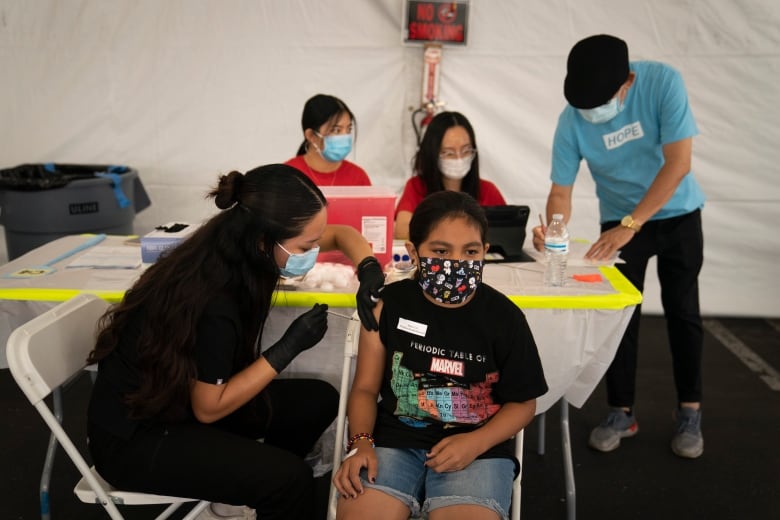An influential advisory panel voted Tuesday that all children ages five to 11 in the U.S. should get Pfizer-BioNTech's pediatric COVID-19 shots, putting the country on the brink of a major expansion of vaccinations — and a final decision is expected within hours.
The Food and Drug Administration had already OK'd kid-sized doses — just a third of the amount given to teens and adults — as safe and effective for the younger age group.
The Centers for Disease Control and Prevention formally recommends who should receive FDA-cleared vaccines, and in a unanimous vote, members of its advisory committee on immunization practices (ACIP) decided Pfizer's shots should be opened to all 28 million children aged five to 11.
If the CDC's director, Dr. Rochelle Walensky, signs off, it will mark the first opportunity for Americans under 12 to get the powerful protection of any COVID-19 vaccine.
"Today is a monumental day in the course of this pandemic," Walensky told the advisory panel as it began its deliberations earlier Tuesday.
She said while the risk of severe disease and death is lower in young children than adults, it is real — and that COVID-19 has had a profound social, mental health and educational impact on youngsters, including widening disparities in learning.
"There are children in the second grade who have never experienced a normal school year," Walensky said. "Pediatric vaccination has the power to help us change all of that."
Health Canada is currently reviewing Pfizer-BioNTech's submission for the children's vaccine to be authorized in this country. The federal government is expecting 2.9 million child-size doses of the vaccine if it is approved, enough for every child to get their first dose.
Pediatricians in parts of the country are ready to start getting shots into little arms as soon as they get the final OK, as Pfizer already has begun shipping millions of doses to states, doctors' offices and pharmacies.
Many pediatricians and parents have clamoured for protection for youngsters so they can resume normal childhood activities without risking their own health — or fearing bringing the virus home to a more vulnerable family member.
'We have seen the devastation'
Several members of the advisory committee who have cared for hospitalized youngsters said they want parents with questions to know the shots are safe and far better than gambling their child will escape a coronavirus infection.
"I have vaccinated my kids," said CDC adviser Dr. Helen Keipp Talbot of Vanderbilt University, saying she wouldn't recommend something for other families unless she was comfortable with it for her own.
"We have seen the devastation of this disease," she said.

In the U.S., there have been more than 8,300 hospitalizations of kids ages five to 11, with about a third requiring intensive care, according to government data. The CDC has recorded at least 94 deaths in that age group, with additional reports under investigation.
And while the U.S. has seen a recent downturn in COVID-19 cases, experts are worried about another uptick with holiday travel and as winter sends more activity indoors where it's easier for the coronavirus to spread.
Pfizer's kid shots contain a third of the vaccine dose that's already been used to vaccinate millions of people 12 and older. The five- to 11-year-olds will receive two shots, three weeks apart, the same schedule as everyone else in the U.S. — but a smaller amount in each shot, using a smaller needle.
A study of 2,268 youngsters found the kid-size vaccine is nearly 91 per cent effective at preventing symptomatic COVID-19 — based on 16 diagnoses among kids given dummy shots compared to just three who got the real vaccination.
CDC officials calculated that for every 500,000 kids this age vaccinated, between 18,000 and 58,000 COVID-19 cases would be prevented, and prevent anywhere from 80 to 226 hospitalizations.
The FDA examined more children, a total of 3,100 who were vaccinated, in concluding the shots are safe. The younger children experienced similar or fewer reactions — such as sore arms, fever or achiness — than teens or young adults get after larger doses.
That study wasn't large enough to detect any extremely rare side-effects, such as myocarditis (heart inflammation) that occasionally occurs after the second full-strength dose, mostly in young men and teen boys. Regulators ultimately decided the benefits from vaccination outweigh the potential that younger kids getting a smaller dose also might experience that rare risk.
Reassuring parents
Some of CDC's advisers said for some parents, deciding to get their children vaccinated may hinge on that small but scary risk.
"The risk of some sort of bad heart involvement is much higher if you get COVID than if you get this vaccine," Dr. Matthew Oster, a pediatric cardiologist at Emory University, told the panel.
"COVID is much riskier to the heart."
Last week, FDA's advisers struggled with whether every young child needed a vaccine. Youngsters hospitalized with COVID-19 are more likely to have high-risk conditions such as obesity or diabetes — but otherwise healthy children can get seriously ill, too, and the CDC's advisers ultimately recommended the shots for all of them.
Pfizer's COVID vaccine should be approved for kids 5 to 11 in the U.S., advisory panel says - CBC.ca
Read More

Tidak ada komentar:
Posting Komentar